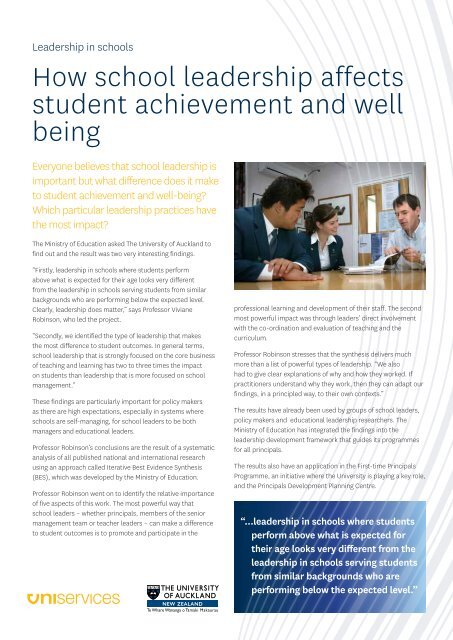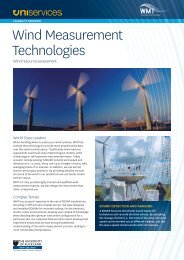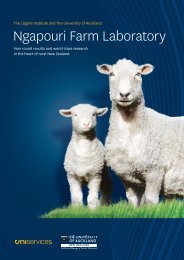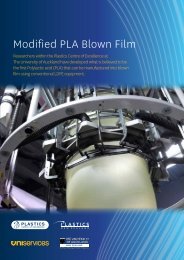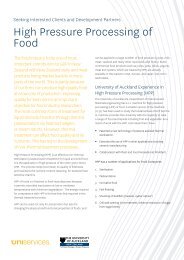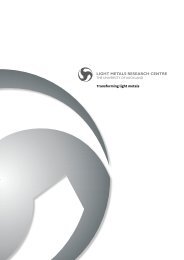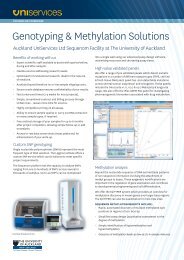How school leadership affects student achievement ... - UniServices
How school leadership affects student achievement ... - UniServices
How school leadership affects student achievement ... - UniServices
Create successful ePaper yourself
Turn your PDF publications into a flip-book with our unique Google optimized e-Paper software.
Leadership in <strong>school</strong>s<br />
<strong>How</strong> <strong>school</strong> <strong>leadership</strong> <strong>affects</strong><br />
<strong>student</strong> <strong>achievement</strong> and well<br />
being<br />
Everyone believes that <strong>school</strong> <strong>leadership</strong> is<br />
important but what difference does it make<br />
to <strong>student</strong> <strong>achievement</strong> and well-being<br />
Which particular <strong>leadership</strong> practices have<br />
the most impact<br />
The Ministry of Education asked The University of Auckland to<br />
find out and the result was two very interesting findings.<br />
“Firstly, <strong>leadership</strong> in <strong>school</strong>s where <strong>student</strong>s perform<br />
above what is expected for their age looks very different<br />
from the <strong>leadership</strong> in <strong>school</strong>s serving <strong>student</strong>s from similar<br />
backgrounds who are performing below the expected level.<br />
Clearly, <strong>leadership</strong> does matter,” says Professor Viviane<br />
Robinson, who led the project.<br />
“Secondly, we identified the type of <strong>leadership</strong> that makes<br />
the most difference to <strong>student</strong> outcomes. In general terms,<br />
<strong>school</strong> <strong>leadership</strong> that is strongly focused on the core business<br />
of teaching and learning has two to three times the impact<br />
on <strong>student</strong>s than <strong>leadership</strong> that is more focused on <strong>school</strong><br />
management.”<br />
These findings are particularly important for policy makers<br />
as there are high expectations, especially in systems where<br />
<strong>school</strong>s are self-managing, for <strong>school</strong> leaders to be both<br />
managers and educational leaders.<br />
Professor Robinson’s conclusions are the result of a systematic<br />
analysis of all published national and international research<br />
using an approach called Iterative Best Evidence Synthesis<br />
(BES), which was developed by the Ministry of Education.<br />
Professor Robinson went on to identify the relative importance<br />
of five aspects of this work. The most powerful way that<br />
<strong>school</strong> leaders – whether principals, members of the senior<br />
management team or teacher leaders – can make a difference<br />
to <strong>student</strong> outcomes is to promote and participate in the<br />
professional learning and development of their staff. The second<br />
most powerful impact was through leaders’ direct involvement<br />
with the co-ordination and evaluation of teaching and the<br />
curriculum.<br />
Professor Robinson stresses that the synthesis delivers much<br />
more than a list of powerful types of <strong>leadership</strong>. “We also<br />
had to give clear explanations of why and how they worked. If<br />
practitioners understand why they work, then they can adapt our<br />
findings, in a principled way, to their own contexts.”<br />
The results have already been used by groups of <strong>school</strong> leaders,<br />
policy makers and educational <strong>leadership</strong> researchers. The<br />
Ministry of Education has integrated the findings into the<br />
<strong>leadership</strong> development framework that guides its programmes<br />
for all principals.<br />
The results also have an application in the First-time Principals<br />
Programme, an initiative where the University is playing a key role,<br />
and the Principals Development Planning Centre.<br />
“...<strong>leadership</strong> in <strong>school</strong>s where <strong>student</strong>s<br />
perform above what is expected for<br />
their age looks very different from the<br />
<strong>leadership</strong> in <strong>school</strong>s serving <strong>student</strong>s<br />
from similar backgrounds who are<br />
performing below the expected level.”
The need to strengthen both<br />
responsiveness and outcomes for<br />
New Zealand’s diverse <strong>student</strong><br />
population<br />
Professor Viviane Robinson<br />
Professor Robinson is an internationally respected educational<br />
researcher specialising in educational <strong>leadership</strong> and<br />
organisational and policy learning. She has published five<br />
books and numerous research articles in leading international<br />
journals. Professor Robinson is also the Academic Director of<br />
the First-time Principals Programme – New Zealand’s national<br />
induction programme for newly appointed principals. In 2007<br />
she was honoured by the Australian Council of Educational<br />
Leaders with an invitation to deliver the William Walker Oration<br />
and with the Headley Beare award for educational writing.<br />
The challenges<br />
••<br />
Determine whether <strong>leadership</strong> practice has a positive impact<br />
on <strong>student</strong> <strong>achievement</strong> and well-being<br />
••<br />
If so, identify the elements or characteristics of those<br />
practices that lead to improved <strong>student</strong> <strong>achievement</strong><br />
••<br />
Identify the knowledge, skills and dispositions that leaders<br />
need to engage confidently in the identified practices<br />
Delivery<br />
Through Best Evidence Synthesis:<br />
••<br />
Locate available research<br />
••<br />
Analyse the quantitative findings to identify relative impact<br />
of various types of <strong>leadership</strong><br />
••<br />
Use qualitative findings to enrich and explain the<br />
quantitative results<br />
••<br />
Identify the knowledge, skills and dispositions required to<br />
engage confidently in the identified <strong>leadership</strong> practices<br />
••<br />
Engage with practitioners and policy makers throughout the<br />
synthesis process<br />
Benefits<br />
••<br />
Confirm the importance of <strong>school</strong> <strong>leadership</strong><br />
••<br />
Identify the relative importance of different types of<br />
<strong>leadership</strong> for making an impact on <strong>student</strong> outcomes<br />
••<br />
General <strong>leadership</strong> and management skills do not deliver the<br />
expected impact on <strong>student</strong> outcomes<br />
••<br />
Clear identification of gaps and limitations in the research<br />
Auckland <strong>UniServices</strong> Ltd<br />
Auckland <strong>UniServices</strong> Limited is a wholly owned company of The<br />
University of Auckland. Established in 1988, <strong>UniServices</strong> manages<br />
all the University’s commercial research and consultancy<br />
partnerships, forms new business ventures based on University<br />
research, and owns and develops the University’s intellectual<br />
property estate.<br />
Its mission is to apply the University’s research and expertise to<br />
client needs and business opportunities, enabling organisations<br />
based on new knowledge to grow, expand the University’s<br />
research capability and benefit the broader community.<br />
Contact<br />
Sandie Gusscott<br />
Senior Business Manager, Arts & Education<br />
+64 9 373 7522 ext 89469<br />
s.gusscott@auckland.ac.nz<br />
Auckland <strong>UniServices</strong> Limited<br />
Level 10, <strong>UniServices</strong> House, 70 Symonds Street, Auckland<br />
Private Bag 92019 AMC, Auckland 1142, New Zealand<br />
www.uniservices.co.nz<br />
May 2010


